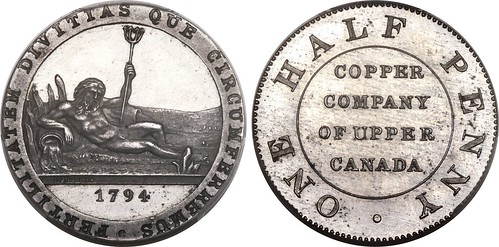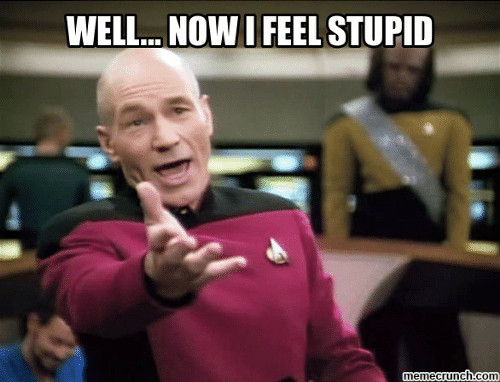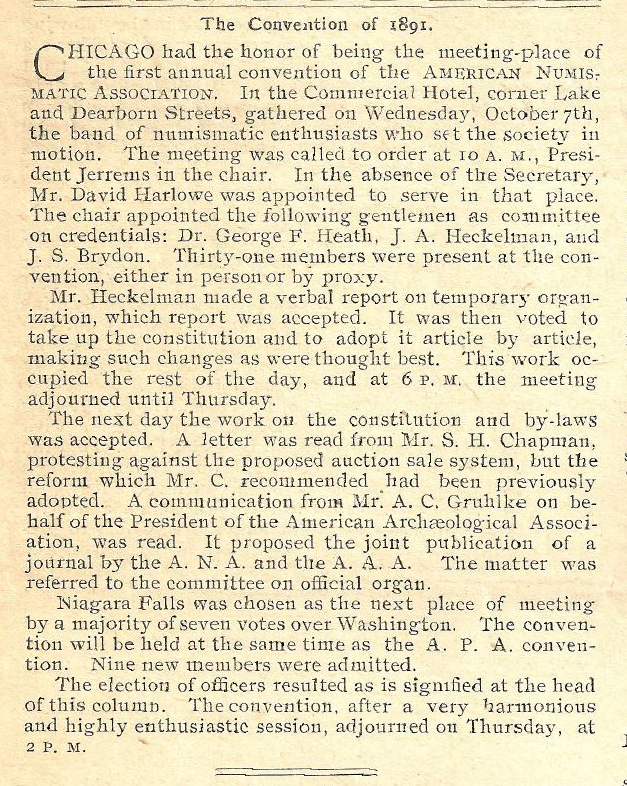
PREV ARTICLE
NEXT ARTICLE
FULL ISSUE
PREV FULL ISSUE
NOTES FROM E-SYLUM READERS: AUGUST 11, 2019Dick Johnson Recovering
Author, researcher and longtime E-Sylum contributor Dick Johnson has been sidelined with some medical issues. I spoke with his wife Shirley this week and she reports that he's doing well and has some idle time in his care facility. -Editor
Shirley writes: "He has gotten books from Library of Congress that he can listen to and enjoys receiving all the cards and notes anyone sends. Cards can be sent to me at home and I will deliver them to him: Shirley Johnson, 139 Thompson Drive, Torrington, CT 06790. E-mails can be sent the normal way, to dick.johnson@snet.net ."
Dick's turning 89 this month. Tell him what you like about his columns, ask a question, or just drop a note or card to say hello. He'll be glad to hear from you. -Editor
FERTILITATEM DIVITIAS QUE CIRCUMFERREMUS
Last week Dave Bowers asked for help on the meaning or translation of the inscription FERTILITATEM DIVITIAS QUE CIRCUMFERREMUS on the obverse of the 1794 Copper Company of Upper Canada halfpenny. I looked for an image that most plainly shows the legend, and found this aluminum restrike in the Heritage January 2017 NYINC Signature Sale, Lot 34136. -Editor
 Martin Purdy of New Zealand writes: The "que" in this legend should be tacked onto Divitias as a suffix, and means "and" here. I read it as "let us spread abundance and wealth". The tense of the verb could be open to discussion - others with better Latin than mine might be able to improve on this.
Thank you! -Editor
To read the earlier E-Sylum article, see:
Buy the note, Not the Label
The very simple solution is to self teach yourself about what you collect. AKA "Buy the Note, not the label".
To read the earlier E-Sylum article, see:
Did Frank Lapa Get Out of Prison?
Last week, Bob Leonard wrote about Frank Lapa dying in prison. I'm certain he did not. Chicago exonumist Ben Odesser once told me someone caught up to him on the street and said "Ben, it's me, Frank." Lapa did not live a long life and I don't know of any numismatic activity after his release. There is much in The E-Sylum about him, in the first issue for 2003.
Bob Leonard of Chicago writes: I knew Ben Odesser well and I never heard from him that Frank Lapa was released early. I think Paul is confused about this. Lapa was convicted of murder in California. I found a news item from the Santa Cruz Sentinel (July 28, 1978) showing that Lapa was sentenced to life in prison. I do not find anything showing that his sentence was commuted or that he escaped.
Thanks. Here are some links to earlier articles about Lapa. -Editor
To read the earlier E-Sylum articles, see:
More on Safe Deposit Box Safety
Exactly a decade ago, during the great financial crisis, Long Island friends of mine were on an extended summer vacation in Italy. Their bank had recently been taken over by a stronger institution, and while they were gone, thieves somehow got into their bank safe-deposit box and stole an estimated $200,000 worth of precious metals. My friends, calling it “an inside job,” notified the local police, who notified the FBI. Of course, the property was never recovered and the case was never solved. My well-off friends chose not to sue, on the advice of their lawyer. My friends, perhaps embarrassed, did not tell me about their loss until 1½ years later. Shortly thereafter, in response to something related in its 25 December 2010 edition, I wrote to The New York Times that Christmas Day to ask how common such thefts are in this country. From then until now, The Times did not publish anything on this subject. And it did not publish or respond to my letter. Such thefts from American banks’ safe-deposit boxes are evidently quite rare. The Cowley piece says: “Of the 19,000 bank robberies reported to the FBI in the last five years, only 44 involved safe-deposit heists.” However, she quotes a Chicago-based industry expert whose firm provides insurance for bank safe-deposit boxes as “estimat[ing] that around 33,000 boxes a year are harmed by accidents, natural disasters and thefts.” Speaking a decade ago with acquaintances at my local branch of JP Morgan Chase, I learned that American banks will not cover the loss of two things stored in the safe-deposit boxes: cash or bullion. That’s easy to understand. Cowley reports that, even then, JP Morgan Chase will cover the contents of a safe-deposit box only up to a total value of $25,000; Wells-Fargo, up to just $500; Citicorp, only up to “500 times the box’s annual rent”; and Bank of America, only up to “ten times the annual rent charged for the box.” Cowley says our largest banks find the boxes more trouble than they are worth and “rarely install them in new branches” any more. In recent years, my bank has significantly tightened its security procedures for letting customers into their safe-deposit boxes. But one of the most reassuring steps that customers can always take in their own interest is to be certain that bank staff know them well, to know the bank employees’ names, and to always be friendly and courteous towards them. The appreciation can then go both ways.
I suspected these events were rare, and it makes sense that risks greatly increase whenever there's a change in bank ownership. -Editor
To read the earlier E-Sylum article, see:
1792 Silver and Non-Silver Center Cents Follow-Up

Maureen Levine writes: Two pieces regarding the 1792 Morris so-called Silver Center Cent have been posted to the Newman Numismatic Portal. The selected responses and call to action are posted at:
The numismatic community responses are posted at:
The articles by Stu Levine are a follow up on analysis of the Morris example of the so-called silver cent (1792 Judd-1). -Editor
To read the earlier E-Sylum articles, see:
Query: ANA Formation Meeting at Columbian Expo?
I recall reading some details of the contingent visiting the site of the WCE then under construction. These details are not in The Numismatist. My query: Does anyone have any correspondence or other information on this? Another possibility is that Dr. Heath, who loved to write, shared his experiences in a local or regional newspaper. He lived in Monroe, Michigan. This is trivia par excellence, but I have always enjoyed details. I look forward to seeing some of you at the World’s Fair of Money.
No detail is too small for a numismatic infomaniac. Can anyone help? Joel Orosz found Charles Taylor Tatman's report (pictured) on the first ANA meeting published in the November 1891 issue of Plain Talk (a predecessor of The Numismatist. It did not mention a visit to the Exposition. Is this information to be found elsewhere in numismatic literature? -Editor
THE BOOK BAZARRE
Wayne Homren, Editor The Numismatic Bibliomania Society is a non-profit organization promoting numismatic literature. See our web site at coinbooks.org. To submit items for publication in The E-Sylum, write to the Editor at this address: whomren@gmail.com To subscribe go to: https://my.binhost.com/lists/listinfo/esylum All Rights Reserved. NBS Home Page Contact the NBS webmaster 
|


